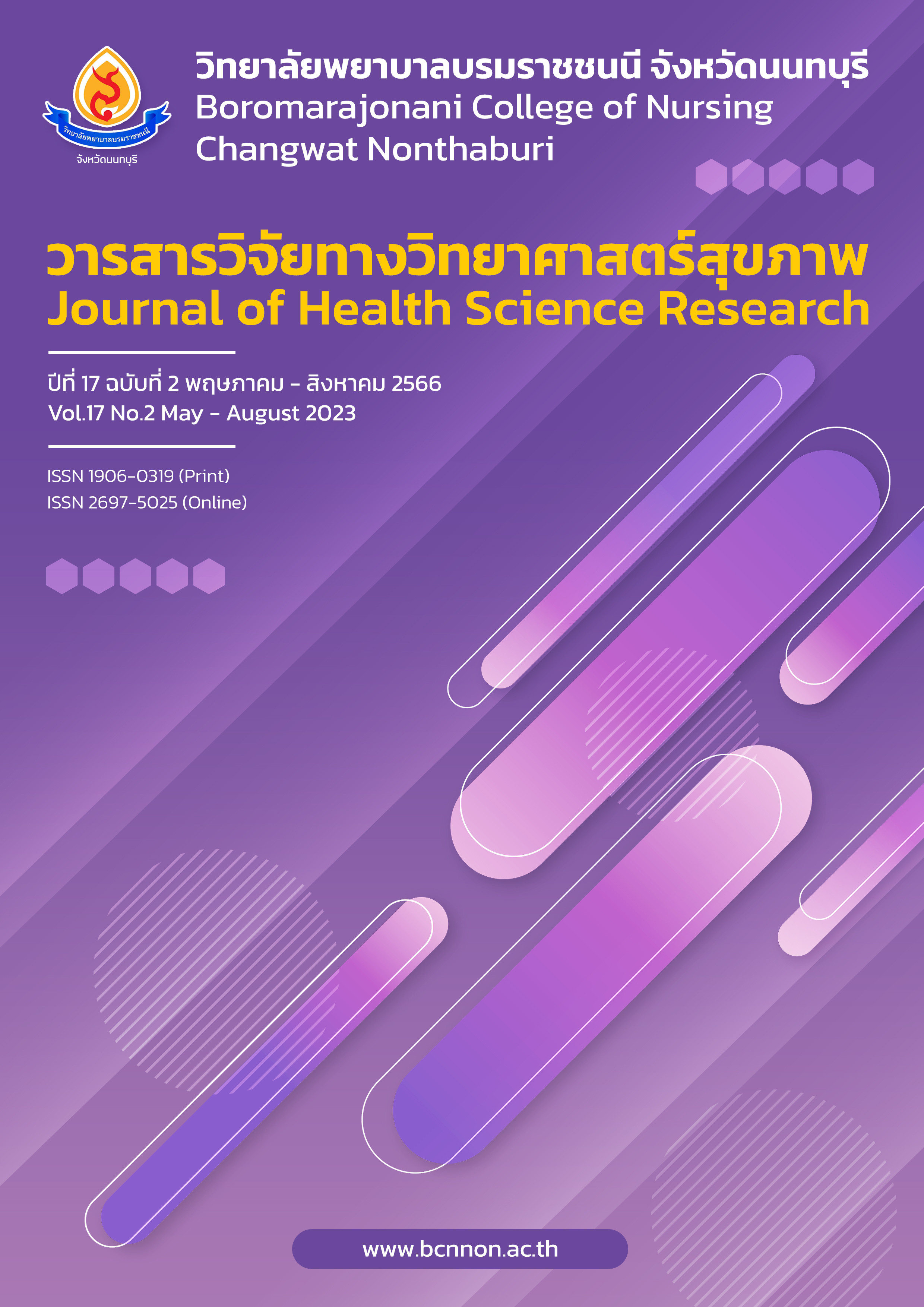การเสริมสร้างพลังสุขภาพจิตของนักศึกษาในสถานการณ์โควิด 19 ด้วยการปรึกษากลุ่มทฤษฎีการรู้คิดและพฤติกรรม
Main Article Content
บทคัดย่อ
บทนำ : สถานการณ์โควิด 19 ส่งผลกระทบต่อนักศึกษารอบด้าน ทำให้เกิดความเครียดและพลังสุขภาพจิตต่ำลง การปรึกษากลุ่มทฤษฎีการรู้คิดและพฤติกรรมเป็นวิธีที่ช่วยเปลี่ยนความคิดอัตโนมัติทางลบเป็นความคิดที่สมเหตุสมผล เกิดความสามารถทางความคิด อารมณ์และจิตใจในการปรับตัวและฟื้นตัวสู่ภาวะปกติ
วัตถุประสงค์การวิจัย : 1) เพื่อศึกษาพลังสุขภาพจิตของนักศึกษาในสถานการณ์โควิด19 และ 2) เพื่อศึกษาผลการเสริมสร้างพลังสุขภาพด้วยการปรึกษากลุ่มทฤษฎีการรู้คิดและพฤติกรรม
วิธีการวิจัย: การวิจัยกึ่งทดลอง ตัวอย่าง คือนักศึกษาชั้นปีที่ 1 คณะศึกษาศาสตร์ มหาวิทยาลัยรามคำแหง จำนวน 306 คน คัดเลือกตัวอย่างแบบเฉพาะเจาะจง เป็นนักศึกษาที่มีคะแนนพลังสุขภาพจิตอยู่ในระดับต่ำ จำนวน 16 คน สุ่มเป็นกลุ่มทดลอง 8 คน และกลุ่มควบคุม 8 คน เครื่องมือที่ใช้ในการวิจัย ได้แก่ แบบวัดพลังสุขภาพจิต และโปรแกรมการปรึกษากลุ่มทฤษฎีการรู้คิดและพฤติกรรมจำนวน 8 ครั้ง วิเคราะห์ข้อมูลโดยใช้สถิติเชิงพรรณนา และทดสอบสมมติฐานโดยสถิติค่าที
ผลการวิจัย : 1) พลังสุขภาพจิตในสถานการณ์โควิด19 ของนักศึกษา โดยรวมอยูในระดับมาก 2) กลุ่มทดลองมีพลังสุขภาพจิตหลังทดลอง และระยะติดตามผลสูงกว่ากลุ่มควบคุมอย่างมีนัยสำคัญทางสถิติที่ระดับ .05 3) กลุ่มทดลองมีพลังสุขภาพจิตในระยะหลังทดลองสูงกว่าก่อนทดลองอย่างมีนัยสำคัญทางสถิติที่ระดับ .05 และ 4) กลุ่มทดลองมีพลังสุขภาพจิตในระยะติดตามผลสูงกว่าก่อนทดลองอย่างมีนัยสำคัญทางสถิติที่ระดับ .05
สรุปผล: การปรึกษากลุ่มทฤษฎีการรู้คิดและพฤติกรรมช่วยให้นักศึกษาที่เผชิญสถานการณ์โควิด 19 มีพลังสุขภาพจิตสูงขึ้น
Downloads
Article Details

อนุญาตภายใต้เงื่อนไข Creative Commons Attribution-NonCommercial-NoDerivatives 4.0 International License.
บทความที่ได้รับการตีพิมพ์เป็นลิขสิทธิ์ของวิทยาลัยพยาบาลบรมราชชนนี จังหวัดนนทบุรี
ข้อความที่ปรากฏในบทความแต่ละเรื่องในวารสารวิชาการเล่มนี้เป็นความคิดเห็นส่วนตัวของผู้เขียนแต่ละท่านไม่เกี่ยวข้องกับวิทยาลัยพยาบาลบรมราชชนนี จังหวัดนนทบุรี และคณาจารย์ท่านอื่น ในวิทยาลัยฯ แต่อย่างใด ความรับผิดชอบองค์ประกอบทั้งหมดของบทความแต่ละเรื่องเป็นของผู้เขียนแต่ละท่าน หากมีความผิดพลาดใด ๆ ผู้เขียนแต่ละท่านจะรับผิดชอบบทความของตนเองแต่ผู้เดียว
เอกสารอ้างอิง
Sansupa K, Kongkraphan U, Sucaromana U, Nantasan P. The adjustment of undergraduate student in pandemic COVID-9. Journal of MCU Humanities Review. 2020;6(2):83-97. (in Thai).
Khumkom S. Effects of group activities on the development of emotional and resilience quotients of the first year nursing students of Suranaree university of technology. Veridian E-Journal Silpakorn University. 2018;11(2):2767-80. (in Thai)
Department of Mental Health. RQ Resilience Quotient the power of mental health. Bangkok: Beyond Publishing CO.,LTD.; 2020. (in Thai).
Buranakunkitkan S, Chaisena-Dallas, J, Hengudomsub P, Pratoomsri W. Relationships between protective factors and resilience among schizophrenia caregivers. Nursing Journal of the Ministry of Public Health. 2018;28(1):24-35. (in Thai).
Phimphakarn K. A strengthening of resilience in patients with major depressive disorder. Journal of Health
Education. 2019;42(2):218-25. (in Thai).
Kitsumban V, Thapinta D, Picheansathian W. The effect of cognitive-behavioural therapy on depression in the elderly: systematic review. Nursing Journal. 2017;44(1): 161-71. (in Thai).
Suktam N, Suttineam K, Kongkham C, Ruttanapolsan C. Enhancing resilience of bullying high school students by cognitive behavior counseling group. Journal of MCU Humanities Review. 2022;8(2):303-20. (in Thai).
Corey g. Theory and practice of group counseling eight edition. Belmont CA: Brooks/Cole; 2012.
Beck JS. Cognitive behavior therapy: Basics and beyond second edition. New York: The Guilford Press; 2011.
Manaspon K, Supwirapakorn W, Suthithatip S. The effect of cognitive behavioral group counseling on mental toughness of high school students. Academic Journal of Humanities and Social Sciences Burapha University. 2019;10(1):274-95. (in Thai).
Hyseni Z, Hoxha L. The impact of COVID-19 on higher education: a study of interaction among students mental health attitudes toward online learning study skills and lifestyle changes. [internet]. 2020. Available from: https:// www.researchgate.net/publication/341599684Theimpact_of_COVID-19on_higher _education_A_studyof interaction_among _Kosovar_students'_mental_health_attitudes_toward_online_learning_study_skills_and_lifestyle_changes.
Suwanaphant K, Seedaket S, Vonok L, Assana S, Wawngam W, Kingsawad K, et al. Factors associated with stress due to corona virus disease 2019 (COVID-19) pandemic among students of the faculty of public health and allied health sciences Praboromarajchanok institute. Journal of Health Science Research. 2020;14(2):138-48. (in Thai).
Lamiani G, Borghi L, Bonazza F, Rebecchi D, Lazzari D, Vegni E. Adjustment processes after the first wave of the COVID-19 pandemic: a grounded theory study based on clinical psychologists' experience. Front Psychol. 2022;13(1):1-8. doi: org/10.3389/fpsyg. 2022.854745.
Lebkhao D. Koolnapadol P, Kerdpitak P. The development of adolescent students social intelligence through integrative group counselling model. Journal of The Royal Thai Army Nurses. 2017;18(3):62-71. (in Thai).
Jacobs EE, Masson RL, Harvil RL. Group counseling: strategies and skills sixth edition. Belmont CA: Brooks/ Cole; 2009.
Corey MS, Corey G, Corey C. Groups process and practice Ninth edition. Belmont CA: Brooks/Cole Cengage Learning; 2014.
Gladding ST. Counseling: a comprehensive profession Third edition. New York: Person education; 1995.
Phathaikruawan S, Panrod T. Factors related to anxiety and anxiety management during the COVID-19 situation case study of students at the faculty of management science, Silpakorn University. The 9th Muban Chombueng Rajabhat University’s National Conference 2021. 638-51. (in Thai).
Erden S. Awareness: the effect of group counselling on awareness and acceptance of self and others. Procedia Soc Behav Sci. 2015;174:1465-73.
Boonboot K. Development of a set of group activities to develop a growth mindset for elementary school students in Nakhonnayok province. Journal of Yala Rajabhat University. 2023;18(1):52-60. (in Thai).


